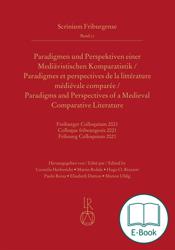The publication presents the results of the interdisciplinary Freiburg Colloquium 2021 (Université de Fribourg, Switzerland) "Paradigms and Perspectives of Comparative Medieval Studies". The contributions explore the theoretical and methodological premises of historically orientated comparative research that focuses on the specific cultural conditions of the pre-modern period. The focus is on two central paradigms in current medievalist discourse: the materiality and mediality of medieval manuscript culture on the one hand and the central role of the Latin language as a supra-regional lingua franca and motor for exchange and innovation across linguistic and cultural borders on the other.
The publication presents the results of the Fribourg Colloquium 2021 "Paradigms and Perspectives of a Mediaeval Comparative Literature - Paradigmes et perspectives de la littérature médiévale comparée - Paradigms and Perspectives of a Mediaeval Comparative Literature". The renowned, interdisciplinary and multilingual Fribourg Colloquia are organised every two years by the Institute of Medieval Studies at the University of Fribourg, Switzerland.
The articles in the current volume offer the results of comparative research in various medieval disciplines, including German Studies, French, Italian and Art Studies. The volume thus contributes to the historical exploration of current comparative discourses. At the same time, the articles illustrate that medievalist disciplines can provide impulses for methodological reflection in General and Comparative Cultural Studies. The studies on the historical characteristics of the medieval epochs make a decisive contribution to the sharpening and differentiation of comparative categories such as 'alterity', 'historicity' or 'cultural difference'.
The essays in this anthology concentrate on specific cultural conditions of the pre-modern period based on two paradigms that are central to current medievalist discourse: the materiality and mediality of medieval manuscript culture on the one hand and the central role of the Latin language as a supra-regional lingua franca and motor for exchange and innovation across linguistic and cultural borders on the other. A further focus of the volume is the interdisciplinary reflection on the theoretical premises and methods of the comparative approach within the framework of medieval studies.
Cornelia Herberichs studierte Germanistik und Anglistik an der LMU München. An der Universität Zürich erfolgten Promotion (,Poetik und Geschichte. Das ‘Liet von Troye‘ des Herbort von Fritzlar’) und Habilitation, letztere mit einer Studie zur Überlieferung des deutschsprachigen religiösen Dramas (,Geistliche Lesespiele. Exemplarische Lektüren mittelalterlicher Passions- und Weihnachtsspiele im Kontext ihrer Überlieferung ‘). Seit 2019 ist sie Ordentliche Professorin für Germanistische Mediävistik an der Universität Freiburg, Schweiz; seit 2022 ist sie Direktorin des dort angesiedelten Zentrums für Handschriftenforschung (ZfH)/Centre de recherche sur les manuscrits (CRM).
Martin Rohde studierte Kunstgeschichte, Deutsche Literatur und Historische Hilfswissenschaften in Freiburg i.Ü. und Pau (Frankreich). 1999 absolvierte er das Lizentiat mit einer Arbeit zum Thema ,Narrative Archivolten in der frühgotischen Portalskulptur Frankreichs‘. 2016 erfolgte die Promotion zum Thema ,Theorien und Doktrinen der französischen Denkmalpflege im 19. Jahrhundert‘. 1997–1999 war er wissenschaftlicher Mitarbeiter am Centre du Recherche sur le vitrail in Romont. Von 2000–2004 war er Sekretär und seit Juli 2004 Geschäftsführer des Mediävistischen Instituts der Universität Freiburg i.Ü.
Die Buchreihe „Scrinium Friburgense“ umfasst Editionen, Monographien und Kolloquiumsbände aus allen Bereichen der Mediävistik, von der Kodikologie, Paläographie und Epigraphik über die mittelalterliche Geschichte, Philosophie- und Kunstgeschichte und die lateinische, deutsche, englische, französische, italienische und spanische Literatur des Mittelalters bis zur Byzantinistik. Besonders willkommen sind Arbeiten interdisziplinären Zuschnitts.


 Sample
Sample